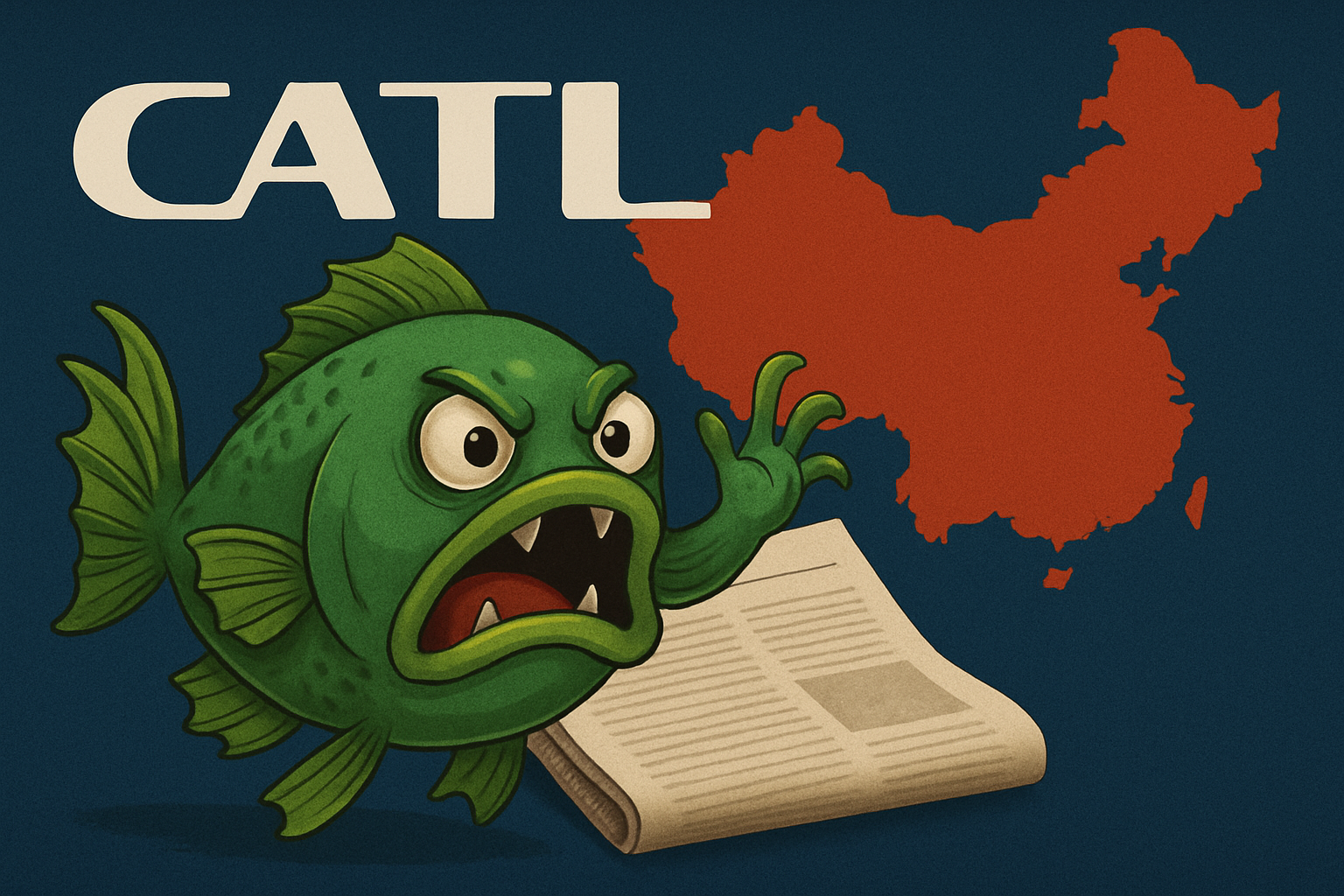
On May 12, 2025, Contemporary Amperex Technology Co. Ltd. (CATL), the world’s leading EV battery maker, restructured its Hong Kong IPO as a Regulation S offering, barring US onshore investors, avoiding SEC oversight before its May 20 debut. This shift from a $5-8 billion target down to a near $4B raise signals the impact of US regulatory pressure, widely reported as tied to CATL’s January 7, 2025, addition to the US Department of Defense’s 1260H list as a Chinese military company. Yet, CATL’s own May 6, 2025, Hong Kong public offering update document says that the DoD sanction is not a material risk. Earlier today the New York Times said that CATL “did not explain why it had changed the structure of its listing” and The Times of India reported today that the Reg S pivot was “a strategic move to minimize potential legal fallout.”
Since my November 18, 2024, article I’ve been working with the open-source intelligence platform Injustice Pool on three research reports on CATL, only relying on publicly available patent data. CATL’s patents, as detailed in the recently published CATL Binder, Avasta and Pellegrino reports, merit a fresh examination. These reports can help authorities and investors better understand why a lack of due diligence of CATL’s nearly 45,000 patents may be a reason why CATL chose to abruptly alter their long-awaited IPO.
The 1260H listing flags CATL for its role in China’s civil-military fusion, allegedly powering attack submarines, prompting removal in 2023-2024 of its batteries from Camp LeJeune and Duke Energy grids. The House Select Committee on the CCP, led by John Moolenaar (R-MI) and Raja Krishnamoorthi (D-IL), in April 2025 urged JPMorgan and Bank of America to exit the IPO, citing CATL’s Xinjiang forced labor ties and military links. And later the same month, the Senate Aging Committee and Select Committee joint hearing with Kevin O’Leary condemned opaque publicly traded Chinese companies that steal IP and then hand off control of their assets (including patents) to the CCP via golden share arrangements, undercutting compliant businesses. O’Leary recommended reviewing how the Biden administration failed to enforce bipartisan laws from the first Trump administration such as the Holding Foreign Companies Accountable act by Senators John Kennedy (R-LA) and Chris Van Hollen (D-MD) and watered down SEC enforcement of opaque Chinese public companies.
And just last week, in a Senate Finance Committee hearing on rare earth semiconductor and battery supply chain issues, Senator Whitehouse (D-RI) highlighted how sanctioning Obama’s Chinese military officials for hacking just sends signals and is not enough. He said President Trump should use tariffs to collect revenues from Chinese companies for stolen American intellectual property.
The Avasta report alleges CATL’s 31,000 global patents (4,600 U.S.) are inflated to mislead investors, constituting financial fraud by overstating innovation to boost IPO valuation. The Pellegrino report highlights inventor Li Changdong’s implausible 1,387 filings in 2023—nearly 7 daily, a rate rivaling history’s top inventors—suggesting manipulation via USPTO’s Patent Prosecution Highway, continuation bypass and other expedited review schemes. U.S. Patent 10,930,932, central to CATL’s Orientation Index (OI) battery chemistry technology, was invalidated in China by CALB, a Chinese competitor, on July 31, 2023 (CN 201810696957.2). China’s CNIPA cited: 1) insufficient disclosure, as CATL failed to provide lab notebooks or reproducible methods (e.g., XRD setup, magnetic-field parameters) to achieve OI’s claimed swelling reduction; 2) lack of novelty, with prior art like JP 2011-86617 A showing OI as a known metric; and 3) no inventive step, as performance claims (3,000–4,000 cycles) lacked raw data and were “contrary to common sense.” The CATL Binder report by Injustice Pool and analysis provided by expert witness Ulrich von Sacken and his materials used in both the US and Chinese invalidation proceedings, illuminte this invalidity assessment by Chinese authorities.
CATL’s CEO Robin Zeng, just after the election attacked Elon Musk and Tesla, and said Musk did not understand battery chemistry. Zeng recently boasted about being #1 in patents worldwide; Musk famously says patents are for the weak, that most are BS and recently agreed that we should delete IP law. That contest between billionaire battery moguls colors CATL’s valuation for their Hong Kong IPO (the company’s third public offering) as it is premised on CATL’s mountain of patents, rapidly built in the past few years, as evidenced by the Pellegrino and Avasta reports.
The Regulation S switch likely reflects U.S. pressure to limit CATL’s American funding, safeguarding security. X posts, like @committeeonccp’s “fueling CCP weapons” echo this. CATL’s dismissal of 1260H as “not a material risk” is needlessly defiant, an unforced error. So, what is the reason for the switch to Reg S? Given how prominently patents feature in the CATL offering documents and how much emphasis the CEO places on measuring growth and power via volume of patents, it is reasonable for authorities and investors to take a look at how quickly CATL created so many patents.
Analysts covering the CATL IPO report that USAA, Lockheed Martin and a Michigan municipal retirement fund are investors in CATL. Local, state and federal officials in Michigan increasingly question why importing technology from CATL and other Chinese firms to help make EVs is a sustainable path, risking dependency and exposure to spyware. Also, American investors like these should question why their funds are going to help a Chinese military fusion company, when according to The Wall Street Journal today that CATL says “it will use 90% of net proceeds from the listing for its Hungary factory.” That’s a long drive from Detroit.
"Peter Harter cut his teeth on encryption export controls at Netscape under Jim Barksdale. After the Dot-Com boom and a stint in the music file-sharing industry, he sold security software to banks and the military before raising U.S. telecom investment for data centers in China. He later obtained a U.S. export license to China for TerraPower, the advanced nuclear reactor backed by Bill Gates and Nathan Myhrvold. Peter built Markup to modernize Congress, tracing legislation and securing remote voting for House Leadership during the pandemic. As founder of Injustice Pool and The Farrington Group, he brings patent expertise to today’s discussion on China’s cognitive warfare and its impact on U.S. innovation."
Peter then built Markup to modernize how Congress and the public trace legislation and votes.
Peter Harter – Bio for NCNI Summit – March 20, 2025
Peter Harter bridges technology, policy, business, law, standards, politics, and entrepreneurship. As Founder of The Farrington Group, he advises management, boards, and investors on political, legislative, and regulatory risks, on issues involving patents, copyrights, EV/ESS/batteries, 5G, quantum, AI, cybersecurity, broadband, precision agriculture, nuclear fission and fusion energy, antitrust and export controls.
Career Highlights
- Co-founder, Markup LLC (2014-2024):Develops SaaS solutions for policymaking and governance, creating products for Congress and other entities with globally distributed teams.
- Intellectual Ventures (2005-2013):Specialized in lobbying for patent reform and regulatory issues, leading teams of 20-50 professionals.
- Securify (2000-2002):Directed business development and sales for network security SaaS, managing sales and legal teams.
- eMusic (1999-2000):Oversaw standards and public policy, addressing antitrust issues and the Secure Digital Music Initiative.
- Netscape (1995-1999):As Global Public Policy Counsel, managed lobbying on encryption, privacy, antitrust, and export controls.
Education
- JD, Villanova University School of Law (1993):Focused on constitutional issues in electronic democracy, contributing to the Environmental Law Journal and participating in the EPA’s toxic cleanup litigation unit.
- BA, Lehigh University (1990):Double major in American Government and Rhetoric, Phi Beta Kappa honoree.
Advisory/Board Activities
- Fair Inventing Fund (2020-Present):Voluntarily supporting underrepresented inventors with access to capital and justice challenges in patent enforcement.
- Co-founder, Precision Agriculture Connectivity & Accuracy Stakeholder Alliance (2018-Present):Advancing broadband speed measurement and mapping audits in agriculture, collaborating with regulators and deploying network testing.
Board Member, Open Source Election Technology Institute (2007-Present):Contributes to election technology advancements, focusing on government relations and donor outreach and development of AI driven Knowledge Base tools for election administration officials to combat misinformation and to automate citizen services and provide an immutable record.






